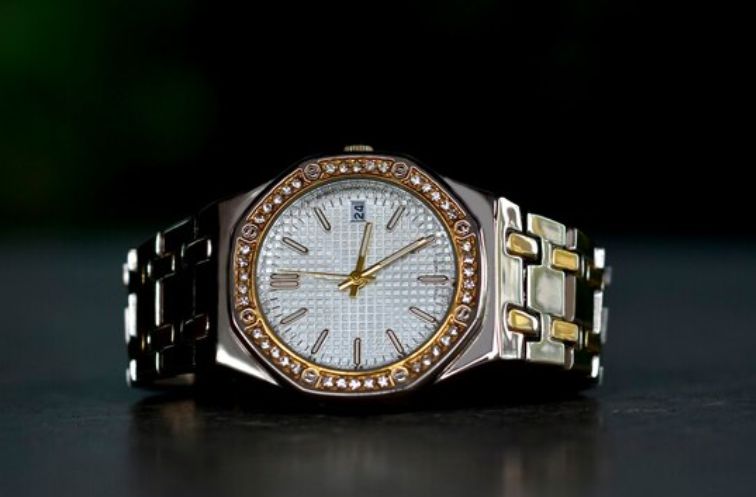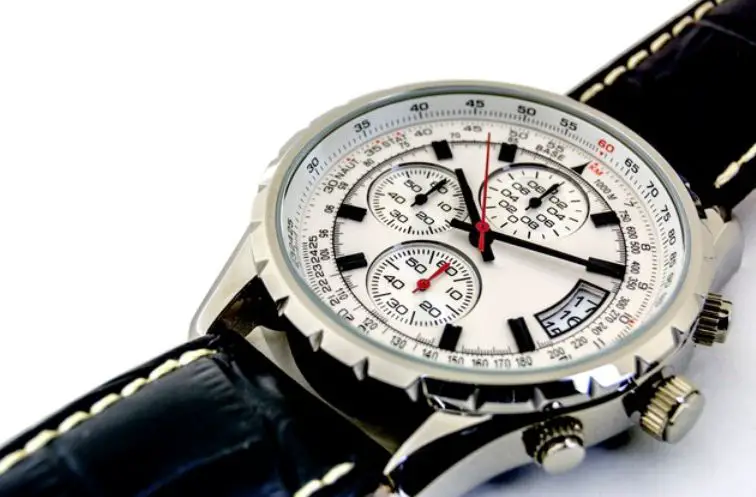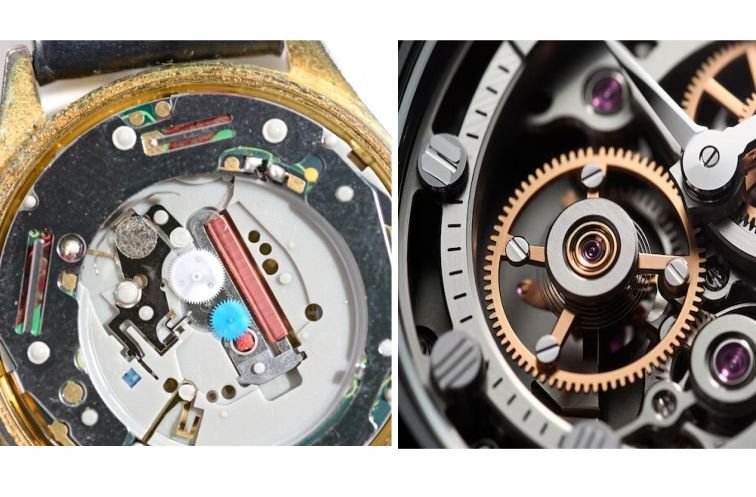Last updated on May 30th, 2025 at 11:25 pm
Quartz vs automatic watches. Know the key differences that matter before your next watch purchase. This guide breaks it down simply so every man can choose the right timepiece.
In modern society, two types of watches dominate the market: quartz and automatic.
These timepieces reflect a man’s personal style, values, and lifestyle.
Choosing between quartz and automatic watches is an important decision, especially for those who care about both functionality and craftsmanship.
Quartz watches are battery-powered, using a quartz crystal to maintain precise time with minimal upkeep.
They are known for their accuracy, affordability, and ease of use.
Automatic watches, also called self-winding watches, use the natural movement of the wrist to power their intricate mechanical systems, appealing to those who admire traditional watchmaking.
This article breaks down the key differences, advantages, and drawbacks of quartz and automatic watches, helping you decide which one aligns best with your daily routine, aesthetic, and long-term needs.
Recommended: Guide to Men’s Watches: Styles, Movements and More
Main Points
- Quartz watches use a battery and quartz crystal, offering precise timekeeping with minimal maintenance and affordable prices for everyday wear.
- Automatic watches are powered by wrist movement, showcasing traditional mechanical craftsmanship, appealing to collectors who appreciate intricate engineering.
- Quartz watches require battery replacements every few years but offer excellent accuracy and low upkeep for busy lifestyles and punctuality.
- Automatic watches need regular wearing or winding and periodic servicing, but often hold or increase value, making them long-term investments.
What is a Quartz Watch?

A quartz watch is a type of watch that runs on a small battery and uses a quartz crystal to keep time.
That crystal vibrates when electricity passes through it, ticking away the seconds with surprising accuracy.
Unlike mechanical watches that rely on gears and springs, this system is simpler and more precise, losing just a few seconds each month.
Characteristics of Quartz Watches
Quartz watches combine technology and simplicity to give you accurate, low-maintenance timekeeping.
If you’re looking for a watch that’s easy to own and wear daily, here’s what makes quartz stand out:
- Power Source: Runs on a small battery that can last for years, providing steady performance without the need for winding or regular adjustments. Simple and convenient for everyday use.
- Accuracy: Uses a vibrating quartz crystal to keep time, resulting in high precision, usually accurate within a few seconds per month. Ideal for people who rely on punctuality.
- Maintenance: Requires little to no upkeep aside from an occasional battery change every couple of years. No winding or servicing needed, making it hassle-free for daily wear.
- Affordability: Generally costs less than automatic or mechanical watches due to simpler internal components. Great option if you want quality timekeeping on a budget.
- Style Range: Available in various designs, including analog and digital, formal or sporty. You’ll easily find a model that fits your style, mood, or occasion.
- Brands to Know: Trusted names like Seiko, Citizen, and Casio offer dependable quartz models known for reliability, smart design, and long-lasting value across different price points.
Related: What are Watch Complications?
What is an Automatic Watch?

An automatic watch, also called a self-winding watch, runs without a battery. It uses the natural movement of your wrist to power the watch.
Inside, a small rotor spins as you move, tightening the mainspring and keeping the watch ticking.
This means you can wear it daily and skip battery changes.
Features of Automatic Watches
If you’re drawn to mechanical precision and timeless design, automatic watches offer more than just function. Here’s what sets them apart:
- Power Source: Uses your wrist movement to wind itself through a spinning rotor. The more you wear it, the more power it builds—no batteries needed.
- Mechanical Movement: Works through a system of gears and springs. Each second you see ticking is powered by pure mechanics, not electricity.
- Maintenance: Needs cleaning and servicing every few years. If you stop wearing it, you may need to wind it manually or use a watch winder.
- Design Appeal: Many automatic watches come with see-through case backs. You can watch the rotor and gears in action, giving you a look into the heart of the watch.
Watch Brands to Know
Rolex, Omega, and Seiko lead the pack. Rolex is known for durability and prestige. Omega blends accuracy with style.
Seiko gives you reliable mechanical watches at different price points.
Automatic watches aren’t for everyone, but if you enjoy classic engineering and want a timepiece with a bit of soul, they might be for you.
Would you like a breakdown of the top entry-level automatic watches or how to choose your first one?
Related Posts
- Watch Movements Explained
- How to Choose the Right Watch for Your Lifestyle
- Popular Men’s Wristwatches
- Men’s Wristwatches Below $1000
- Guide to Luxury Men’s Watches
- Men’s Watches Under $100
- Ultimate Guide to Pocket Watches
- Routine care guide for men’s watches
Quartz vs Automatic Watches: The Differences
Choosing between a quartz and an automatic watch comes down to how you want your watch to work, feel, and last.
Both have their strengths, and knowing the differences helps you pick what fits you best.
Power Source
Quartz: Uses a small battery that powers a quartz crystal to keep time
Automatic: Uses your wrist movement to wind a spring and power the watch
Accuracy
Quartz: Keeps time with better precision, loses just a few seconds a month
Automatic: Can lose or gain seconds daily depending on wear and conditions
Maintenance
Quartz: Low upkeep, just replace the battery every few years
Automatic: Needs occasional servicing to clean and oil the moving parts
Price and Value
Quartz: Usually more affordable and widely available
Automatic: Costs more but may hold value better over time, especially for collectors
Feel and Build
Quartz: Lighter and comes in a wide range of designs
Automatic: Heavier and mechanical, giving it a traditional, solid feel
Which One Should You Choose?
If you want a watch that’s accurate, easy to maintain, and budget-friendly, go for quartz.
If you appreciate mechanical movement, classic design, and don’t mind occasional care, an automatic might be your style.
| Feature | Quartz Watch | Automatic Watch |
|---|---|---|
| Power Source | Runs on a battery and a vibrating quartz crystal | Powered by your wrist movement through a winding rotor |
| Accuracy | Very accurate—loses only a few seconds per month | Slight daily drift depending on wear and movement |
| Maintenance | Low maintenance—mainly battery replacement every few years | Requires servicing every few years to keep it running well |
| Price | Generally more budget-friendly | Usually more expensive due to mechanical craftsmanship |
| Feel and Weight | Lightweight and easy to wear | Heavier with a solid, traditional build |
| Value Over Time | Less likely to appreciate in value | Can hold or increase value, especially with luxury brands |
Related: Here Are Signs Your Wristwatch Maintenance is Due
Pros and Cons of Quartz Watches
When choosing a watch, knowing what quartz watches offer helps you make a smart decision.
Here’s a clear look at what you gain and what you might deal with.
Pros
- Affordable Price: Quartz watches usually cost less than mechanical ones. The simpler design and production make them easier on your wallet, so you can find reliable options without spending a lot.
- Accurate Timekeeping: You don’t have to worry about your watch losing time. Quartz technology keeps time steady, with only a few seconds of difference each month, perfect if you need to stay punctual.
- Low Maintenance: No winding or complicated care needed. Just change the battery every few years, and your watch will keep working smoothly with little effort from you.
Cons of Quartz Watches
- Less Craftsmanship Appeal: If you value the art of watchmaking, quartz watches might feel less special. They lack the complex, mechanical parts that some collectors love.
- Battery Changes Required: Batteries don’t last forever. You’ll need to replace them every few years. If you delay, it could damage the watch, adding some hassle and cost over time.
Pros and Cons of Automatic Watches
If you like watches with a mechanical heart and a story behind every tick, automatic watches might catch your interest.
Here’s a clear look at what you get and what to watch out for.
Pros of Automatic Watches
- Craftsmanship You Can See: When you wear an automatic watch, you carry the skill of watchmakers on your wrist. The complex gears and moving parts often show through the case, letting you appreciate the engineering behind every second.
- No Batteries Needed: You don’t have to worry about changing batteries. Your natural wrist movement powers the watch, making it eco-friendly and easy to keep running if you wear it regularly.
- Long-Term Value: These watches often hold their value well. Their build and mechanical design make them more than just timekeepers—they can become heirlooms or collectibles.
Cons of Automatic Watches
- Higher Price Tag: The detailed work and materials mean you’ll pay more upfront. If you want an automatic watch, be ready for a bigger investment compared to quartz options.
- Needs Regular Wearing or Winding: If you don’t wear it every day, the watch can stop. You’ll have to wind it manually or reset the time, which can be less convenient if you switch watches often.
- Maintenance Can Add Up: Over time, automatic watches need servicing to keep the gears running smoothly. This means extra care and occasional visits to a watchmaker.
Here’s a table summarizing the pros and cons of quartz vs automatic watches:
| Aspect | Quartz Watches | Automatic Watches |
|---|---|---|
| Pros | ||
| Affordable Price | Usually cost less due to simpler design and production | Mechanical craftsmanship often visible and appreciated |
| Accurate Timekeeping | Keeps time steady with only a few seconds difference monthly | Powered by your wrist movement, no battery needed |
| Low Maintenance | Just change battery every few years, no winding required | Can last long and hold value as collectibles |
| Cons | ||
| Craftsmanship Appeal | Lacks complex mechanical parts that collectors love | Higher upfront cost due to detailed work and materials |
| Battery Changes | Needs battery replacement every few years, risk of damage if delayed | Needs regular wearing or winding to keep running |
| Maintenance | Minimal upkeep aside from battery changes | Requires servicing over time to maintain performance |
If you’d like, I can help you create a more detailed or visually enhanced version for your website or article.
Automatic watches give you a mechanical experience and no battery hassle, but they need your attention to keep ticking.
Looking for more tips on choosing between automatic and quartz? Just let me know!
Which One Should You Choose?
Picking between a quartz and an automatic watch comes down to what fits your life and style best. Here’s a simple way to think it through.
Think About Your Lifestyle
If you want a watch that stays accurate with little fuss, quartz is a solid choice.
Battery-powered, quartz watches keep time well and need only a battery change every few years.
They handle daily wear, workouts, and busy schedules without demanding much from you.
On the flip side, if you appreciate mechanical engineering and enjoy the feel of tradition, an automatic watch might speak to you.
It runs on your wrist’s movement and carries the charm of craftsmanship.
You’ll need to wear it regularly or wind it to keep it running, which makes it better suited if you enjoy having a ritual with your watch.
Budget and Value
Quartz watches usually cost less upfront. If you want a reliable timepiece without spending too much, quartz gives you good value.
Automatic watches can be pricier, but they can hold value or even become collectibles.
Think of them as more than just a watch, they can be an investment in craftsmanship.
Practical Use or Statement Piece
Ask yourself: Do you want a watch to wear every day without worrying?
Or are you looking for something that makes a statement or shows off fine watchmaking?
Quartz watches fit the practical role well. Automatic watches tend to be conversation starters and symbols of horology tradition.
Your watch says something about you. Whether you choose quartz for its ease or automatic for its story, pick what feels right on your wrist and fits your daily needs.
Need help finding models that match your choice? I’m here to help.
Frequently Asked Questions
Which watch type is more accurate, quartz or automatic?
Quartz watches are generally more accurate, losing only a few seconds per month, while automatic watches may gain or lose seconds daily.
How often should I service an automatic watch?
Automatic watches typically require servicing every 3 to 5 years to clean and oil moving parts for optimal performance.
Do quartz watches need winding like automatic watches?
No, quartz watches run on batteries and do not require winding, making them easier to maintain for everyday use.
Can automatic watches stop if not worn regularly?
Yes, if not worn or wound manually, automatic watches can stop running and will need resetting to resume accurate timekeeping.
Conclusion
Choosing between quartz and automatic watches depends on your lifestyle, preferences, and values.
Quartz watches provide precise, low-maintenance timekeeping powered by batteries, ideal for men seeking reliability and affordability.
Automatic watches offer a mechanical experience powered by your wrist’s movement, perfect for those who admire traditional craftsmanship and are willing to invest time in upkeep.
While quartz watches require occasional battery replacements, automatics need regular servicing and wearing to keep functioning.
Quartz excels in accuracy and convenience, whereas automatics hold potential long-term value and storytelling charm.
Ultimately, your watch should reflect your style and daily needs, helping you stay punctual or showcasing your appreciation for horological artistry.
References
- Momentum Watches: Quartz vs Automatic Watches: Making the Right Choice
- Jura Watches: How Quartz Differs from Automatic Watches
Pious Clements, an influential and experienced writer, is prolific on social issues and challenges prevailing gender roles on his website, “The Conducts of Life”. With an unwavering commitment to inclusivity and equality, Pious fearlessly unpacks societal norms and sheds light on the overlooked complexities.
His eloquent analyses and thought-provoking articles make him a trusted voice amplifying narratives that have long been silenced. Join Pious on his journey as he strives to reshape the world, one word at a time.

